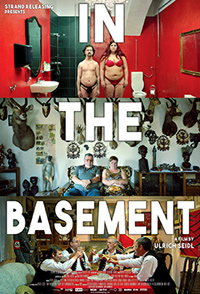Dungeons, Nazis and Latex Babies: Seidl Puts Modern Cave Dwellers on Display
 Paradise trilogy helmer Ulrich Seidl returns to docu form in what could easily be called a non commentary, no narrative, strictly observational look into an underground assortment of weird, carnie-type Austrian folk and the horrors they keep in their basements. Distinctive in its revelations about its subjects and steering clear of the notorious imprisonment cases that shocked Austrians and the world alike, In The Basement is an oddball entry, yet strangely alluring to be watched in awe, shock or marvelment. Why the helmer decided to feature these people is anyone’s guess.
Paradise trilogy helmer Ulrich Seidl returns to docu form in what could easily be called a non commentary, no narrative, strictly observational look into an underground assortment of weird, carnie-type Austrian folk and the horrors they keep in their basements. Distinctive in its revelations about its subjects and steering clear of the notorious imprisonment cases that shocked Austrians and the world alike, In The Basement is an oddball entry, yet strangely alluring to be watched in awe, shock or marvelment. Why the helmer decided to feature these people is anyone’s guess.
First there’s the tuba player who reveals his massive collection of Nazi memorabilia and still refers to the police as ‘the Gestapo’. His brass band mates gather in his swastika-emblazoned basement to drink and discuss Hitler. Then there’s the woman who keeps a large doll collection in a cupboard, but treats them as real babies by putting them to bed (in their boxes) every night. There’s also an opera-singer who manages a shooting range and a taxidermy enthusiast, who boasts about having eaten every animal it’s possible to eat.
However, it’s the couples who enjoy sado-masochism that the documentary is most interested in, and presents five people who seek out pleasure from pain and have either set up torture dungeons in their own homes or frequent parlors to be whipped or restrained. In some very explicit scenes, a man is ordered by his ‘mistress’ (his wife) to clean the bathroom with his tongue.
Seidl’s Dog Days (winner of the Silver Lion at Venice Film Festival, 2001) was considered controversial due to its depiction of unsimulated sex, and his latest trilogy Paradise paraded a lot of grotesque characters across our screens. Considering this, there may be a progression in his work here. However, it’s unclear what Seidl wishes to convey with In The Basement, other than that people keep all their strange hobbies confined to their cellars, and it’s with this unique documentary that we are able to see that. His focus on the Nazi supporter and the fetishists suggests that these are people who are forced to hide their true selves in public because of the judgement they may face, but the film in no way debates that they should face it. Considering the recent atrocities uncovered in the Joseph Fritzl case, it’s a wonder Seidl didn’t delve further into his character’s motivation and defend Austrians’ secret habits. But perhaps he’ll answer our questions in his next foray into the weird and wonderful.
Reviewed on October 13th at the 2014 BFI London Film Festival Review – Documentary Competition. 86 Minutes
★★★/☆☆☆☆☆


